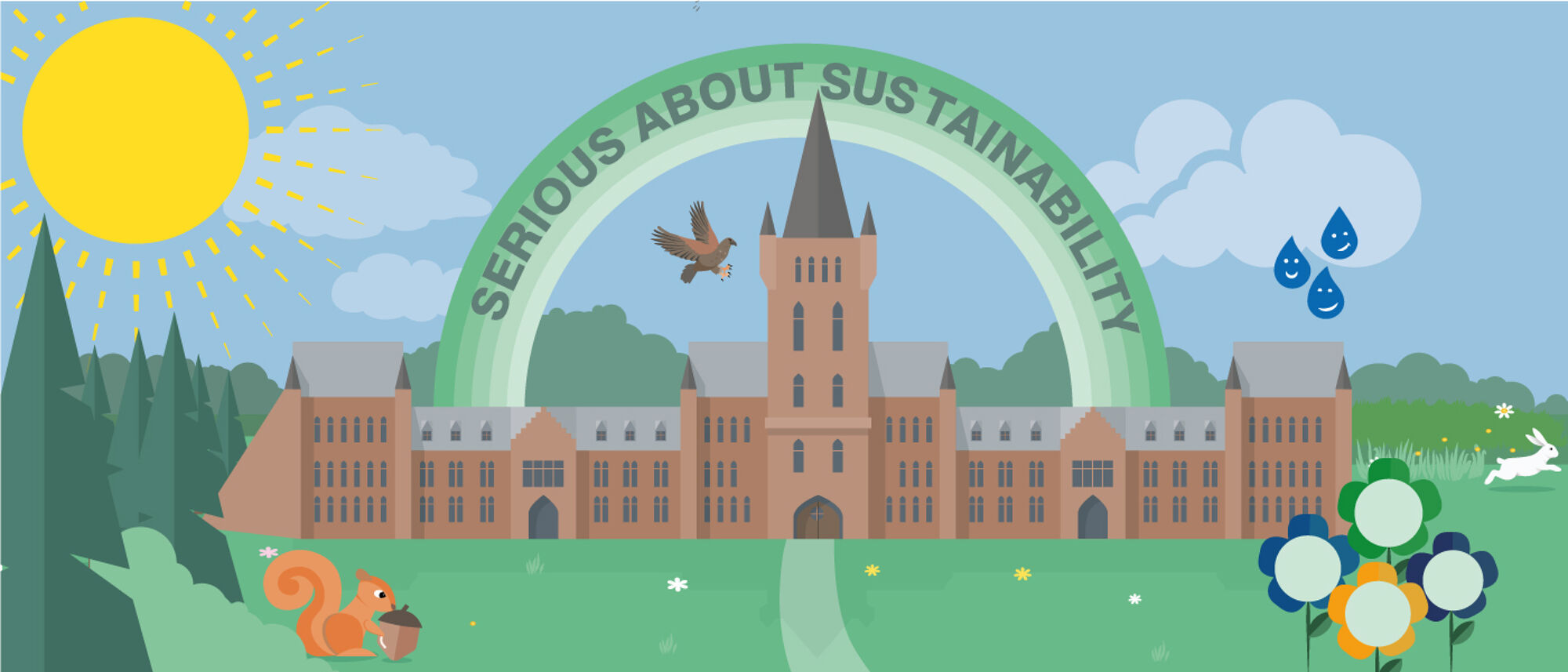
Progress for the planet
At Glasgow, we’re taking sustainability seriously – and we’ve been recognised for our efforts.
In June 2023 we were ranked 13th in the world in both the QS Sustainability Rankings and the Times Higher Education Impact Rankings, a rise of six places, for our contribution to the United Nations’ Sustainable Development Goals (SDGs). These 17 objectives cover activities across social, economic and environmental sustainability, such as Reduced Inequalities (SDG 10); Decent Work and Economic Growth (SDG 8); and Climate Action (SDG 13). By aligning our research closely with the SDGs, we can help tackle the most pressing global challenges facing humanity and the natural world.
The SDGs provide a strong framework for us to contribute to helping solve some of the most critical natural and human-made threats to our planet. We submitted evidence demonstrating our impact in relation to all 17 of the SDGs, and although the number of participating institutions increased by 183 this year, we still improved our ranking by six places, “passing the assessment with flying colours”.
At a glance
• We're 2nd in the world for SDG11: Sustainable Cities and Communities
• We're 6th in the world for SDG16: Peace, Justice and Strong Institutions
• We're 9th in the world for SDG17: Partnerships for the Goals
• Solar power from the photovoltaic panels on the JMS Learning Hub roof is enough to charge 15,000 smartphones
• £4.4bn is the value of our economic contribution to the UK economy
• We're safeguarding peregrine falcons – the highly protected species has been nesting in our tower for the past 20 years
• The rainwater harvested on the roof of the JMS Learning hub is enough to fill an Olympic-sized swimming pool
• We planted 300 native trees as a legacy of hosting the inaugural Global Sustainable Development Congress
We're sharing in £100 million investment
‘Levelling Up’ funding of £100 million from the Department for Science, Innovation and Technology will support 11 ambitious new projects around the city, six of which are directly linked to the University, and help accelerate the city of Glasgow’s thriving innovation economy.
The UofG-linked projects cover wide-ranging initiatives such as
• next-generation remote sensing, to look at the viability of new technologies in uncooled infra-red detectors
• the digitisation of chemistry and the creation of chemical robot farms
• ‘Museums in the Metaverse’, an extended reality culture and heritage platform that will empower online visitors to better explore vast cultural assets
• the creation of a centre of excellence that focuses on innovation in financial regulation
• an early surveillance tool for catching bowel cancer and pre-cancer as early as possible.
Vice-Principal for Economic Development and Innovation Uzma Khan said: “It’s a hugely exciting development for Glasgow City Region. Through the Glasgow Riverside Innovation District, this significant investment will draw on the University’s world-leading research, global reach and strong civic mission to make Glasgow one of the most innovative economies in the UK."

Better human rights for detainees
Ill-treatment of detained persons, whether at time of arrest, during pre-trial detention, or following conviction, is a systemic issue in many Eastern European countries. The work of Professor James Murdoch of the School of Law has underpinned changes to law, policy, and practice to safeguard rights and ensure better standards for detainees in North Macedonia, Bulgaria and Georgia.
Professor Murdoch has worked with the Council of Europe and beneficiary governments to implement recommendations and strengthen human rights in these countries. In North Macedonia, the mechanism designed to ‘police the police’ and influence the treatment of detainees by the police in accordance with human rights standards has contributed to better treatment and complaints processes for approximately 3,000 people.
Professor Murdoch’s work has also been key in delivering training to 2,000 judges in Bulgaria and producing a report leading to new human rights-compliant standards which protect around 12,000 detainees annually in Georgia.

A resilient future
The surge of a flooded river can swirl up historic environmental pollutants and cause vast ecological harm that affects crops, wildlife and human health. The National Centre for Resilience, based at our Dumfries campus, is dedicated to enhancing Scottish communities' capacity to withstand and recover from floods and other natural hazards. The centre uses existing knowledge and commissions new projects to address real-life issues faced by resilience practitioners and communities. Upcoming proposed projects will deliver against one of the five themes of: Community preparedness, Risk assessment & early warning systems, Infrastructure & built environment resilience, Social & economic resilience and Community engagement & education. We believe that building resilient communities is crucial to minimise the impact of natural hazards, protect lives and promote sustainable development.

Natural space prolongs your life
Boosting the amount of natural space and private gardens has the potential to narrow the lifespan gap between those living in the most and least deprived areas, a study from our MRC/CSO Social and Public Health Sciences Unit found. Areas with the highest income deprivation had the lowest average percentage cover of natural space and gardens and people living in these areas had the highest levels of ill health. “In practice, not everyone can live in an area with a high percentage of green or natural space,” says Professor Rich Mitchell of the unit. “However, this does not mean that even small amounts of such areas are not beneficial.”
The study found that every 10% increase in natural space cover was associated with a 7% fall in the incidence of premature death. Increased availability of natural space within local areas was also associated with a reduction in the disparity in years of life lost between the most and least deprived areas.


